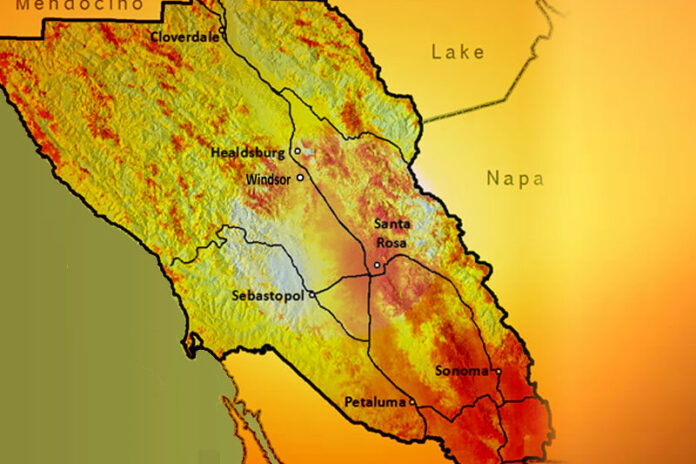As the Trump Administration works to dismantle the Environmental Protection Agency and deny human-caused climate change and the State of California keeps suing to preserve west coast environmental protections, the smaller governments of Sonoma County are flying under the radar, steadily attacking their ambitious goals to reduce greenhouse gas emissions by whopping amounts and shifting regional transportation modes and power usage.
In 2009, Sonoma County became the first region in the nation to adopt a Climate Protection Authority. All 10 municipalities and key county transportation, energy and resource agencies joined in a “Climate Action 2020 and Beyond” effort under a newly formed umbrella, the Sonoma County Regional Climate Protection Authority (RCPA).
Eight years past their first marker in 2010, the RCPA partners are checking on their progress and renewing their formal government collaboration.
Two weeks ago, the city of Healdsburg became the first partner to renew its formal agreements with RCPA. Other cities are now reviewing their original agreements and look poised to follow suit.
The full set of agreements include work to reduce greenhouse gas emissions, solid waste reduction, housing construction energy conservation, new bicycling, electric vehicle and transportation demand programs and water-saving policies.
So far, the local governments and their community partner groups have shown “mixed success,” according to RCPA executive director Suzanne Smith.
“Given we haven’t completed all of the sectors I can’t say where we will land but I’m optimistic our 2015 inventory (will) show a very meaningful reduction in GHG emissions that will have us on track to meet our goal of 25 percent below 1990 levels by 2020 and 80 percent below 1990 levels by 2050,” said Smith.
Last week the city council of Healdsburg heard a list of local success, including increases in the city’s purchases of carbon-free energy, implementation of a new bike share program, installation of six new electric vehicle stations, converting all street lights to low cost LED and an idea for future installation of floating solar collectors at the city’s wastewater treatment facility.
A profile of the community’s energy usage showed that 61 percent was from on-road transportation and another 31 percent was consumed in building energy.
Besides the 10 incorporated cities the other RCPA partners include the Sonoma County Water Agency, Sonoma Clean Power, Sonoma County Agricultural Preservation and Open Space District and the Northern Sonoma County Air Pollution Control District.
Community groups also have joined the effort including the county’s bicycle coalition, conservation action groups, agriculture and winery associations, Native American tribes and local schools and colleges.
Last Saturday (March 11) students from Sebastopol area schools led a Climate Action Workshop at the Sebastopol Grange, following a formal resolution supporting the student climate activists by the West Sonoma County union High School District (WSCUHSD).
Language in the resolution recognized climate change as a “human issue” and stated that “the urgency and magnitude of climate change requires leadership from all leaders and all institutions.”
Student leaders included Kaya Weber and Kai Guthrie. Guthrie told the trustees: “What we need is public will for common sense national climate action to raise your voice and lead the growing chorus of local community leaders driving out the silence and demanding large scale national climate action (and) help protect current and future students.”
The Schools for Climate Action are not official RCPA partners, but have adopted the same greenhouse gas emission goals that adhere to the aggressive GHG goals recently set by California Gov. Jerry Brown.
California’s goals seek a 40 percent GHG reduction below 1990 levels by 2030 and 80 percent below 1990 levels by 2050.
The county’s Regional Climate Protection Authority also has been active in the ongoing wildfire recovery. RCPA is providing research findings on future wild fire risks due to climate change and other related factors. The agency held a “Rebuild Green Expo” in February as well.
56.3
F
Healdsburg
July 9, 2025









